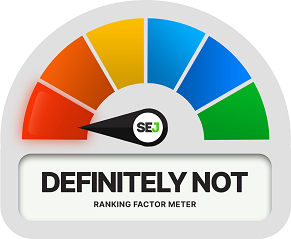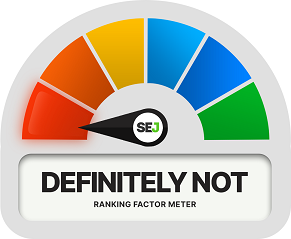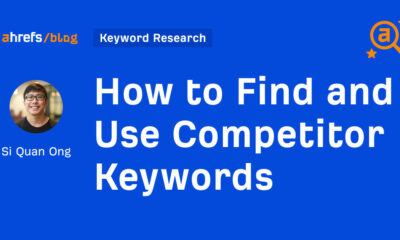Content Length: Is It a Google Ranking Factor?

One of the longest-running debates in SEO happens to involve the length of content and whether it has an impact on rankings.
Word count is said to be a factor for search results, with claims suggesting Google sees high word counts as a sign of high-quality content.
Let’s investigate those claims and settle the debate around word count as a ranking factor.
The Claim: Content Length is a Ranking Factor
Content is king, so having more content than competitors is thought to be better for search rankings.
Based on the theory that word count is an indicator of content quality, SEO experts claim a larger word count can help with achieving greater ranking positions.
Some experts even go as far as to recommend a specific word count as a “sweet spot” for landing on the first page of Google.
These claims lead marketers and companies to believe they need to stretch their content to reach a certain number of words in order to be competitive in Google.
The Evidence for Content Length as a Ranking Factor
Google is frequently asked if word count is a ranking factor, meaning we have a lot of evidence to draw from for this section.
According to all the evidence available, it’s clear that word count is not a ranking factor.
Google’s John Mueller says exactly that in a Reddit thread where an SEO asks how to analyze word counts in a SERP
He states:
“Word count is not a ranking factor. Save yourself the trouble.”
Here’s another statement from Mueller on Twitter confirming that word count is not used to evaluate content quality:
“Word count is not indicative of quality. Some pages have a lot of words that say nothing. Some pages have very few words that are very important & relevant to queries. You know your content best (hopefully) and can decide whether it needs the details.”
In one more example, Mueller advises that adding more text to a page will not make it better from Google’s perspective:
“From our point of view the number of words on a page is not a quality factor, not a ranking factor.
So just blindly adding more and more text to a page doesn’t make it better.”
Content Length as a Ranking Factor: Our Verdict

Word count is confirmed to not be a ranking factor.
What Google cares most about when raking search results is satisfying user intent.
It may take 50 words, 100 words, or 1,000 words to communicate what a searcher needs to know. That number will vary from query to query.
If a user is searching for a question that warrants a quick answer, then a shorter piece of content is more than capable of ranking on the first page.
There’s no benefit to extending the length of content to fit an arbitrary word count.
Featured Image: Paulo Bobita/SearchEngineJournal
AI
Exploring the Evolution of Language Translation: A Comparative Analysis of AI Chatbots and Google Translate

According to an article on PCMag, while Google Translate makes translating sentences into over 100 languages easy, regular users acknowledge that there’s still room for improvement.
In theory, large language models (LLMs) such as ChatGPT are expected to bring about a new era in language translation. These models consume vast amounts of text-based training data and real-time feedback from users worldwide, enabling them to quickly learn to generate coherent, human-like sentences in a wide range of languages.
However, despite the anticipation that ChatGPT would revolutionize translation, previous experiences have shown that such expectations are often inaccurate, posing challenges for translation accuracy. To put these claims to the test, PCMag conducted a blind test, asking fluent speakers of eight non-English languages to evaluate the translation results from various AI services.
The test compared ChatGPT (both the free and paid versions) to Google Translate, as well as to other competing chatbots such as Microsoft Copilot and Google Gemini. The evaluation involved comparing the translation quality for two test paragraphs across different languages, including Polish, French, Korean, Spanish, Arabic, Tagalog, and Amharic.
In the first test conducted in June 2023, participants consistently favored AI chatbots over Google Translate. ChatGPT, Google Bard (now Gemini), and Microsoft Bing outperformed Google Translate, with ChatGPT receiving the highest praise. ChatGPT demonstrated superior performance in converting colloquialisms, while Google Translate often provided literal translations that lacked cultural nuance.
For instance, ChatGPT accurately translated colloquial expressions like “blow off steam,” whereas Google Translate produced more literal translations that failed to resonate across cultures. Participants appreciated ChatGPT’s ability to maintain consistent levels of formality and its consideration of gender options in translations.
The success of AI chatbots like ChatGPT can be attributed to reinforcement learning with human feedback (RLHF), which allows these models to learn from human preferences and produce culturally appropriate translations, particularly for non-native speakers. However, it’s essential to note that while AI chatbots outperformed Google Translate, they still had limitations and occasional inaccuracies.
In a subsequent test, PCMag evaluated different versions of ChatGPT, including the free and paid versions, as well as language-specific AI agents from OpenAI’s GPTStore. The paid version of ChatGPT, known as ChatGPT Plus, consistently delivered the best translations across various languages. However, Google Translate also showed improvement, performing surprisingly well compared to previous tests.
Overall, while ChatGPT Plus emerged as the preferred choice for translation, Google Translate demonstrated notable improvement, challenging the notion that AI chatbots are always superior to traditional translation tools.
Source: https://www.pcmag.com/articles/google-translate-vs-chatgpt-which-is-the-best-language-translator
Google Implements Stricter Guidelines for Mass Email Senders to Gmail Users

Beginning in April, Gmail senders bombarding users with unwanted mass emails will encounter a surge in message rejections unless they comply with the freshly minted Gmail email sender protocols, Google cautions.
Fresh Guidelines for Dispatching Mass Emails to Gmail Inboxes In an elucidative piece featured on Forbes, it was highlighted that novel regulations are being ushered in to shield Gmail users from the deluge of unsolicited mass emails. Initially, there were reports surfacing about certain marketers receiving error notifications pertaining to messages dispatched to Gmail accounts. Nonetheless, a Google representative clarified that these specific errors, denoted as 550-5.7.56, weren’t novel but rather stemmed from existing authentication prerequisites.
Moreover, Google has verified that commencing from April, they will initiate “the rejection of a portion of non-compliant email traffic, progressively escalating the rejection rate over time.” Google elaborates that, for instance, if 75% of the traffic adheres to the new email sender authentication criteria, then a portion of the remaining non-conforming 25% will face rejection. The exact proportion remains undisclosed. Google does assert that the implementation of the new regulations will be executed in a “step-by-step fashion.”
This cautious and methodical strategy seems to have already kicked off, with transient errors affecting a “fraction of their non-compliant email traffic” coming into play this month. Additionally, Google stipulates that bulk senders will be granted until June 1 to integrate “one-click unsubscribe” in all commercial or promotional correspondence.
Exclusively Personal Gmail Accounts Subject to Rejection These alterations exclusively affect bulk emails dispatched to personal Gmail accounts. Entities sending out mass emails, specifically those transmitting a minimum of 5,000 messages daily to Gmail accounts, will be mandated to authenticate outgoing emails and “refrain from dispatching unsolicited emails.” The 5,000 message threshold is tabulated based on emails transmitted from the same principal domain, irrespective of the employment of subdomains. Once the threshold is met, the domain is categorized as a permanent bulk sender.
These guidelines do not extend to communications directed at Google Workspace accounts, although all senders, including those utilizing Google Workspace, are required to adhere to the updated criteria.
Augmented Security and Enhanced Oversight for Gmail Users A Google spokesperson emphasized that these requisites are being rolled out to “fortify sender-side security and augment user control over inbox contents even further.” For the recipient, this translates to heightened trust in the authenticity of the email sender, thus mitigating the risk of falling prey to phishing attempts, a tactic frequently exploited by malevolent entities capitalizing on authentication vulnerabilities. “If anything,” the spokesperson concludes, “meeting these stipulations should facilitate senders in reaching their intended recipients more efficiently, with reduced risks of spoofing and hijacking by malicious actors.”
Google’s Next-Gen AI Chatbot, Gemini, Faces Delays: What to Expect When It Finally Launches

In an unexpected turn of events, Google has chosen to postpone the much-anticipated debut of its revolutionary generative AI model, Gemini. Initially poised to make waves this week, the unveiling has now been rescheduled for early next year, specifically in January.
Gemini is set to redefine the landscape of conversational AI, representing Google’s most potent endeavor in this domain to date. Positioned as a multimodal AI chatbot, Gemini boasts the capability to process diverse data types. This includes a unique proficiency in comprehending and generating text, images, and various content formats, even going so far as to create an entire website based on a combination of sketches and written descriptions.
Originally, Google had planned an elaborate series of launch events spanning California, New York, and Washington. Regrettably, these events have been canceled due to concerns about Gemini’s responsiveness to non-English prompts. According to anonymous sources cited by The Information, Google’s Chief Executive, Sundar Pichai, personally decided to postpone the launch, acknowledging the importance of global support as a key feature of Gemini’s capabilities.
Gemini is expected to surpass the renowned ChatGPT, powered by OpenAI’s GPT-4 model, and preliminary private tests have shown promising results. Fueled by significantly enhanced computing power, Gemini has outperformed GPT-4, particularly in FLOPS (Floating Point Operations Per Second), owing to its access to a multitude of high-end AI accelerators through the Google Cloud platform.
SemiAnalysis, a research firm affiliated with Substack Inc., expressed in an August blog post that Gemini appears poised to “blow OpenAI’s model out of the water.” The extensive compute power at Google’s disposal has evidently contributed to Gemini’s superior performance.
Google’s Vice President and Manager of Bard and Google Assistant, Sissie Hsiao, offered insights into Gemini’s capabilities, citing examples like generating novel images in response to specific requests, such as illustrating the steps to ice a three-layer cake.
While Google’s current generative AI offering, Bard, has showcased noteworthy accomplishments, it has struggled to achieve the same level of consumer awareness as ChatGPT. Gemini, with its unparalleled capabilities, is expected to be a game-changer, demonstrating impressive multimodal functionalities never seen before.
During the initial announcement at Google’s I/O developer conference in May, the company emphasized Gemini’s multimodal prowess and its developer-friendly nature. An application programming interface (API) is under development, allowing developers to seamlessly integrate Gemini into third-party applications.
As the world awaits the delayed unveiling of Gemini, the stakes are high, with Google aiming to revolutionize the AI landscape and solidify its position as a leader in generative artificial intelligence. The postponed launch only adds to the anticipation surrounding Gemini’s eventual debut in the coming year.
-

 PPC4 days ago
PPC4 days ago19 Best SEO Tools in 2024 (For Every Use Case)
-

 MARKETING7 days ago
MARKETING7 days agoWill Google Buy HubSpot? | Content Marketing Institute
-
SEARCHENGINES7 days ago
Daily Search Forum Recap: April 16, 2024
-

 SEO7 days ago
SEO7 days agoGoogle Clarifies Vacation Rental Structured Data
-

 MARKETING6 days ago
MARKETING6 days agoStreamlining Processes for Increased Efficiency and Results
-
SEARCHENGINES6 days ago
Daily Search Forum Recap: April 17, 2024
-

 SEO6 days ago
SEO6 days agoAn In-Depth Guide And Best Practices For Mobile SEO
-

 PPC6 days ago
PPC6 days ago97 Marvelous May Content Ideas for Blog Posts, Videos, & More














